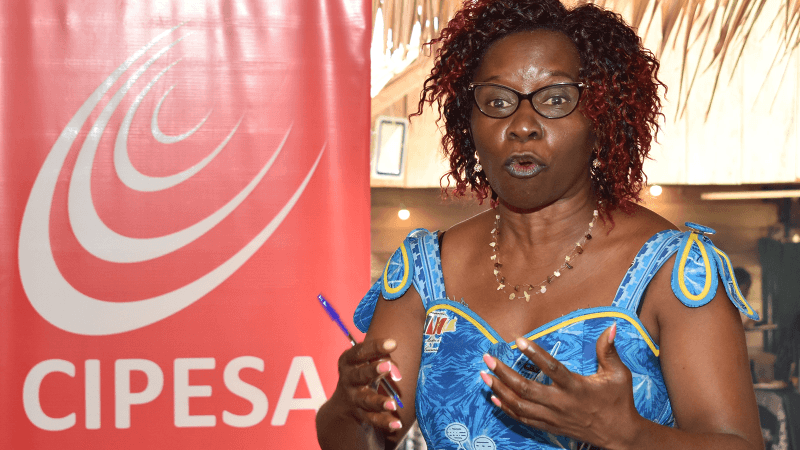By Alice Aparo and Simone Toussi |
The 2023 theme for International Women’s Day (IWD) was “DigitALL: Innovation and technology for gender equality” and sought to highlight the need for inclusive and transformative technology and digital education. This theme resonated with efforts on the digital inclusion of girls and women by the Collaboration on International ICT Policy for East and Southern Africa (CIPESA), which have included trainings, research and policy engagements.
In commemoration of this year’s IWD, on March 10, 2023, CIPESA hosted a regional webinar titled “Tech4Equality: Advocating for Gender Inclusive ICT Policy and governance” that aimed to recognise and celebrate women and girls championing the advancement of transformative technology and digital education. The webinar assembled gender experts from a host of countries including Namibia, Tanzania, Uganda, and Zambia.
In Yaounde, Cameroon, CIPESA alongside Civic Watch and DefyHateNow engaged women journalists at a workshop on the opportunities for embracing technology while also being alive to the challenges inherent to journalism in the digital space. The workshop, which took place on March 17, 2023, was part of a wider series of IWD events organised by DefyHateNow in Cameroon, including a virtual dialogue on the role of women in peacebuilding, another workshop on digital inclusion, as well as profiling women leaders in the country, including Sophie Ngassa, Pedmia Shetu, Caroline Mveng, Balbine Manga, Sandrine Moussima, and Ndi Nancy Saiboh.
Additionally, CIPESA supported the Women and Media Symposium organised by the Uganda Media Women’s Association (UMWA), which took place on March 25, 2023. The symposium celebrated women journalists and addressed broader issues around gender-based violence against women.
Collectively, these engagements assembled a wide spectrum of stakeholders from civil society, media, governance, and the private sector. The engagements echoed similar sentiments on the value of a safe and affordable access to the internet as an enabler of increased utilisation of digital opportunities by women. Speaking at the Cameroon workshop, multimedia journalist Comfort Musa stated that, “The internet is full of opportunities and solutions. It levels the playing ground and has solutions for women looking to start their own publications, create their own channels, find sources, engage audiences, find jobs, get scholarships, and training, make more money, verify information and collaborate with other journalists’’.
At the regional webinar, Nashilongo Gervasius Nakale, a lecturer at the Namibia University of Science and Technology and also a founder of the Internet Society Namibia Chapter, stressed that a meaningful internet accessibility environment where women can learn, work, or conduct research could help shape innovation and an inclusive tech industry.
Despite the digitalisation progress in various countries across the continent, the gender digital divide has remained persistent and has been exacerbated by the growth in online violence against women, which has seen some women withdraw from online engagement and the expression of opinions publicly. This is particularly worrying as often these are voices needed to further critical discussions such on public service delivery, media freedom, good governance and civic engagement.
At the webinar, Neema Lungangira, a Member of Parliament from Tanzania and the Chairperson of the African Parliamentary Network on Internet Governance, pointed out that online violence against women in politics was a growing threat to democracy, and it included all types of aggression, compulsion, and intimidation aimed at keeping women out of politics just because they are women. She added that online abuse against women was increasingly becoming part of deliberate political strategies used by non-liberal and anti-democratic forces to chill women’s and girls’ political goals and participation, reduce their presence and agency in politics and public affairs and limit their awareness to inform policy decision-making and legislative advocacy in parliaments.
While women journalists face similar circumstances as women in politics, and both face gendered hate speech online. To address such concerns in countries such as Cameroon, Ethiopia, and South Sudan, DefyHateNow has developed a toolkit aimed at providing guidance to individuals and organisations on identifying and navigating divisive content online, including at a gender level.
Indeed, while participants highlighted experiences at national level, these discussions resonated with Goal 5 of the United Nations Sustainable Development Goals (SDGs) which also informed discussions at the Commission on the Status of Women (CSW). The Commission is the principal global intergovernmental body exclusively dedicated to promoting gender equality and empowering women. This year marked the sixty-seventh session and saw the approval of conclusions focused on gender equality and the empowerment of women and girls in the context of innovation, technological change, and education in the digital age.
Among these included the Commission recognising “the important contribution of the science and technology community to sustainable development, especially the important contributions of women and girls to education, science, technology, engineering, mathematics and innovation.” Further to this, the Commission also recognised the critical role digital platforms can play as spaces where all women can advocate, mobilise and participate fully, equally and meaningfully in public life. It emphasises that women’s and girls’ online contributions can foster inclusive and participatory public discourse and policy outcomes that take into account the interests, needs and perspectives of all women and girls.

